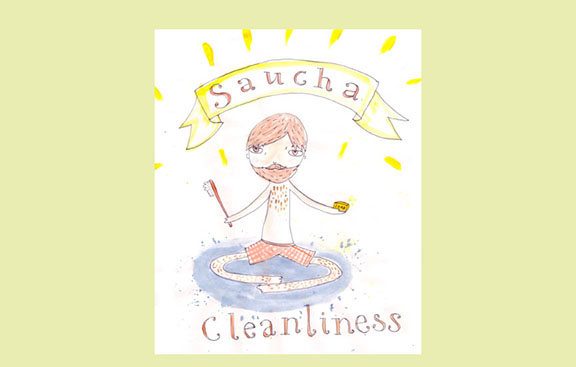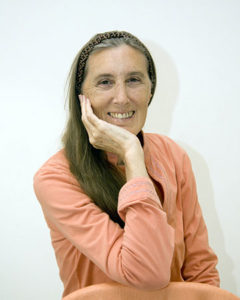 After years of dedicated service in Integral Yoga ashrams and centers in California, New York, Virginia, India and other places, Swami Divyananda now travels more than ever, calling the entire world her home. Along the journey, she has learned some insightful lessons on the rewards of simplicity and saucha, which she shares in this article.
After years of dedicated service in Integral Yoga ashrams and centers in California, New York, Virginia, India and other places, Swami Divyananda now travels more than ever, calling the entire world her home. Along the journey, she has learned some insightful lessons on the rewards of simplicity and saucha, which she shares in this article.
“Moreover, one gains purity of sattva, cheerfulness of mind, one-pointedness, mastery over the senses and fitness for Self-realization.” ~Sutra 41, Book Two, The Yoga Sutras of Patanjali
Among the ethical teachings of Raja Yoga, only saucha (purity) warrants two sutras. Saucha is not one of the more popular teachings of Raja Yoga since, in sutra 40, it is associated with disgust for the physical body. However a good look at the benefits listed above is certainly enough to awaken our enthusiasm, plus it is straightforward and uncomplicated. The entry-level practice of saucha consists of keeping up with our personal hygiene and maintaining order and cleanliness in our surroundings. It is one of those practices that Swami Satchidananda would describe as “elementary but elephantary.”
When he first came to America, Swami Satchidananda was surrounded by throngs of eager students, most of us in full revolt against the values of our parents. Cleanliness was not one of our priorities. He saw our devotion and saw our lifestyle, and he must have glimpsed the big job he had ahead. “Your parents should have trained you in these things,” he commented and then added, “This must be my karma.” Then he set to work. “It’s not that cleanliness is next to godliness,” he admonished us, “cleanliness is godliness!”
At one point we begged him to attend our meditations and infuse his spirit into us. He would not. He said “I’m always with you, whether or not I’m there in my physical body, and I know how you meditate by how you work.” All the markers were there for him, clear as day. Did we check to see if the pen worked before we handed it to him? Did we wipe the rim of the coffee jar before recapping it? He was exacting. Each moment mattered, every action mattered, and “nothing misses me, Miss.” He noticed how we closed a door, and how we moved a chair. In hindsight we realize he was training us to develop the consciousness of relaxed alertness necessary for meditation.
Swami Satchidananda (Gurudev) moved through the same world as we do, but his world was mysteriously different. He saw more, he cared more, he was more careful. He was attentive to each “insignificant” detail. He folded his dirty clothes carefully; he was never in a careless hurry. When staying at a hotel, there was no leaving the room for the maid to clean up. He straightened up the room, made his bed, carefully placed the towels he had used in the bathroom. He was in love with his world and the world was in love with him: there was always beauty and synchronicity around him. For Sri Gurudev, saucha was the natural expression of an unencumbered mind. His peace was pristine, and his environment was pristine as well. Cleanliness and purity were a natural expression of his consciousness.
Though I loved Gurudev’s example, I could not seem to follow it. It turned out that I was missing a key piece of information: It is easier to keep your things in order if you have fewer of them. In this regard, some of my best teachers emerged from the gentle people of India.
One of the surprises of India was to step off a chaotic and trash-filled street into a private home that was freshly swept, completely tidy, and sparsely furnished. Many times I visited the homes of our educated, well-dressed, and competent sangha members, to discover that their whole family shared two rooms and that my friend’s possessions filled a total of two shelves. Their example stood in sharp contrast with the typical environment of an American home and the clutter to which we are accustomed.
Even more impressive was the experience of visiting the home of a tea estate worker, high in the mountains above Coimbatore. The tea estate workers occupy one of the bottom rungs of Indian society. The estate owners provided only one room—maybe 12 by 12 in size—for each family, with shared bathrooms. I remember stepping from the shimmering heat of the day into the welcome shade of one of these one-room homes. As my eyes adjusted and I looked around I saw that the family belongings were neatly folded on a few shelves. A few canisters of kitchen supplies sat above a one-burner stove. That was all. Yet that little dwelling had an airy spaciousness in it and our hostess glowed with happiness. A neighbor appeared with a couple of folding chairs for us and our hostess served us tea. As we were leaving she gifted me with a single stem of bright geraniums.
It opened my eyes; I came back to America with shame for our lifestyle. What a fruitless pursuit it is to invest ourselves in possessions to secure our happiness. It seems to be a process that snowballs: The more we possess, the more empty we feel and so we redouble our efforts to acquire more. Of course, in a way it’s not our fault. The geniuses of the advertising world have figured out the inside track to our psyche and how to manipulate us. Our national economy depends on our addiction to shopping—it’s patriotic to spend! The latest statistics show that 75 percent of the possessions in an American home are not being used.
Meanwhile we pay a heavy price for our consumerism. Everything we own requires maintenance—dusting at the very minimum—and ownership involves being the caretaker. As the motto goes, “What you own, owns you.” Possessions consume our time and energy, and they take up space in our consciousness as well. Somehow the subtle part of our consciousness includes all our belongings. Like an extended body, our sense of “me” is as large as all we own. With my new lifestyle as an itinerant monk I had to give more time and attention to keeping things in order. Soon it became apparent that my office/bedroom reflects my mind and also affects my mind. I discovered that I can correct for being off-balance, or overwhelmed, if I tackle my personal space and put it in order. This aspect of saucha works like a reset button; it never fails to ground me.
Henry David Thoreau wrote, “Our life is frittered away by detail. Simplify, simplify.” Because of moving often, it became imperative for me to simplify. At first I had a hard time identifying what is clutter and what is essential. My best technique is to box up everything questionable and stash it out of sight. Then after six months, reassess. It’s a sly way of easing things out of the grasp and attachments of the mind. Usually I had totally forgotten about most of the boxed-up items.
There are many ways to simplify. The following ideas come from Clutter Busting by Brooks Palmer. He proposes that you walk through your house and ask yourself these questions:
- If my home were a store, would I consider buying what I currently own?
- If my home were a refrigerator, which items have passed the expiration date?
- Are you keeping this item just because it was expensive? Or, just because it was a great bargain?
- If I had to make an emergency move, what would I save?
When I discovered how transformative it is, I became eagle-eyed for ways to simplify. Even belongings that were expensive or took a lot of effort to acquire had, unbeknownst to me, turned into burdens. I cannot tell you the unique delight and lightness I feel when I transfer them into the care of the Goodwill store. Projects that I once cherished have been plopped into the trash can and the clang of the lid—shutting them out of my life forever—is sweet music. My life and room have breathing space. My soul has more peace.
I never dreamed how powerful this process would be or how much it would affect my consciousness. It seems as though the clutter in my mind during meditation has reduced in proportion with the clutter among my possessions. It felt as if I could march right into my mind and sort out the thoughts. Let’s throw out guilt! Let’s throw out nostalgia! Technically, this is probably not really saucha. I’m still just laying the foundation for saucha by practicing a form of voluntary simplicity, but meanwhile it has given me a direction and a goal.
Whenever we prepared a room for Sri Gurudev, we dusted every light bulb, removed every bent coat hanger, and wiped every floorboard and door jamb. Even before he arrived, the room would have this amazing vibration: perfection awaiting perfection. Now that he has left his body, one thing that reliably brings his presence back to me is an immaculate and serene space. I set up a lot of rooms for Sri Gurudev over the years—in various places and throughout his travels—and sometimes my materials were pretty basic, especially in India. But it didn’t matter to him, as long as we had thoughtfully prepared the space and had taken the time to make it sparkle. Now I ask myself, how would I prepare my own room if he were coming to stay? It’s amazing how much you can do with even very limited items. That’s my goal. Then I could bask in the divine presence always.
About the Author:
 Swami Divyananda is one of Integral Yoga’s senior monastics and foremost teachers. Over the years she has served as the director of the Integral Yoga Institutes in Los Angeles, San Francisco, and Coimbatore, India, and as the Ashram Manager of Satchidananda Ashram–Yogaville in Virginia. In addition to teaching at these centers, she has taught Yoga and meditation on special retreats, in corporations and universities, at the Commonwealth Cancer Center and for the Dr. Dean Ornish Heart Disease Programs. Swami Divyananda served for eleven years at the Integral Yoga Institute in Coimbatore, South India and continues to lead pilgrimage tours through India.
Swami Divyananda is one of Integral Yoga’s senior monastics and foremost teachers. Over the years she has served as the director of the Integral Yoga Institutes in Los Angeles, San Francisco, and Coimbatore, India, and as the Ashram Manager of Satchidananda Ashram–Yogaville in Virginia. In addition to teaching at these centers, she has taught Yoga and meditation on special retreats, in corporations and universities, at the Commonwealth Cancer Center and for the Dr. Dean Ornish Heart Disease Programs. Swami Divyananda served for eleven years at the Integral Yoga Institute in Coimbatore, South India and continues to lead pilgrimage tours through India.

